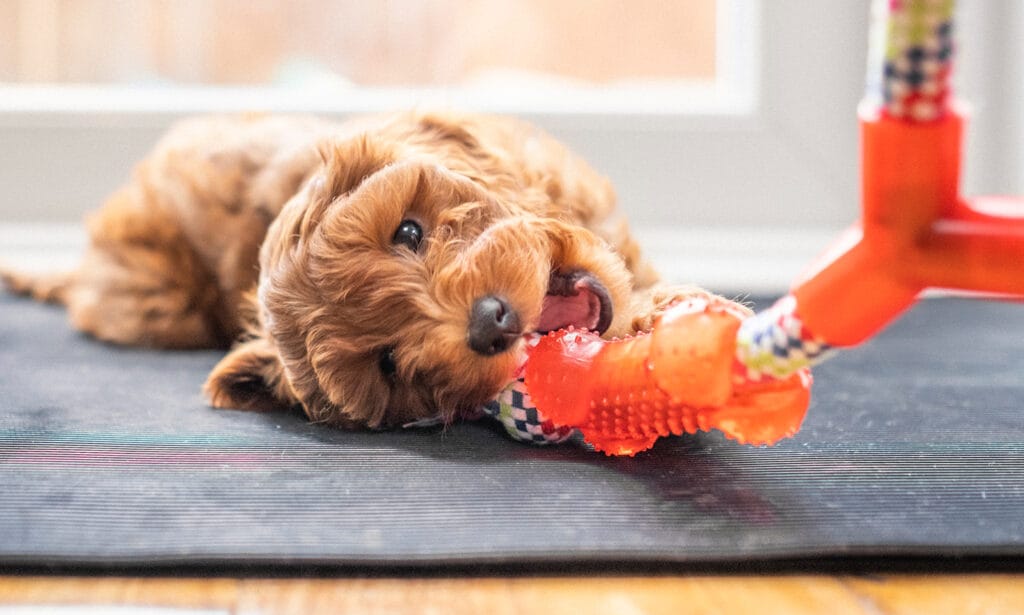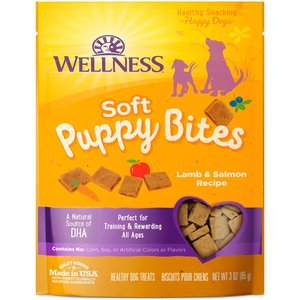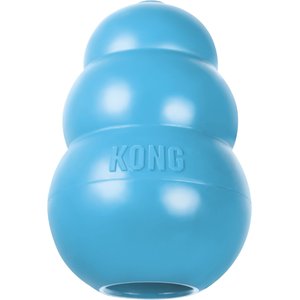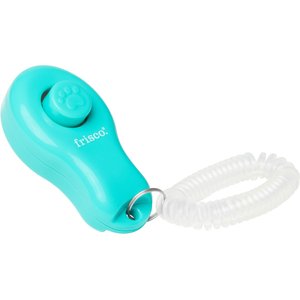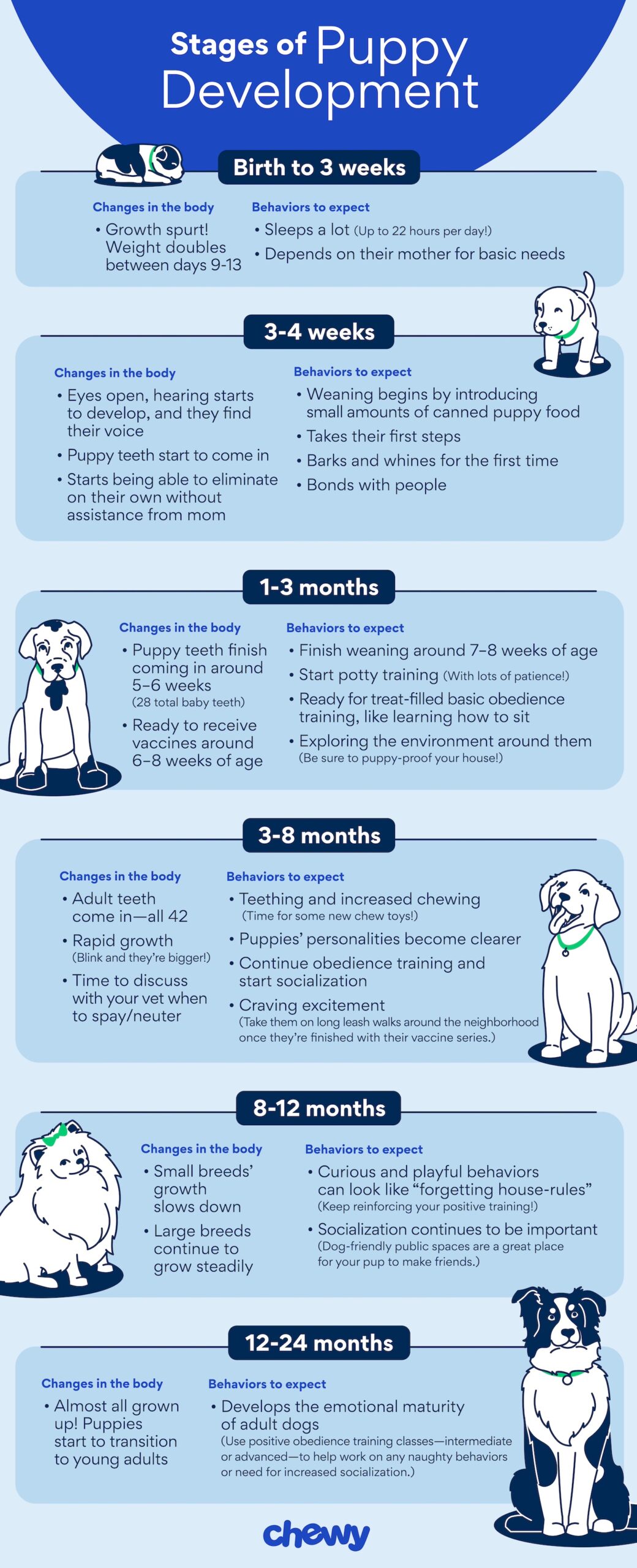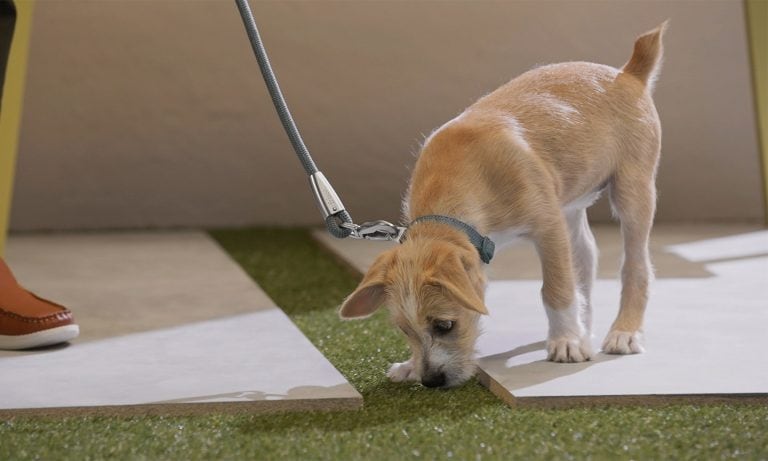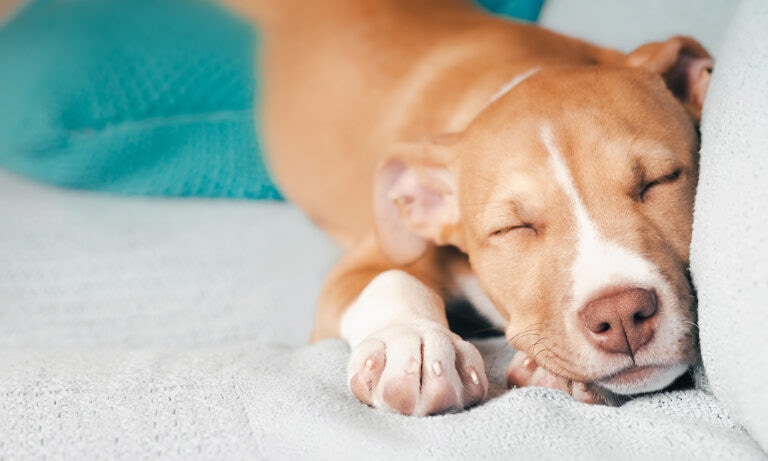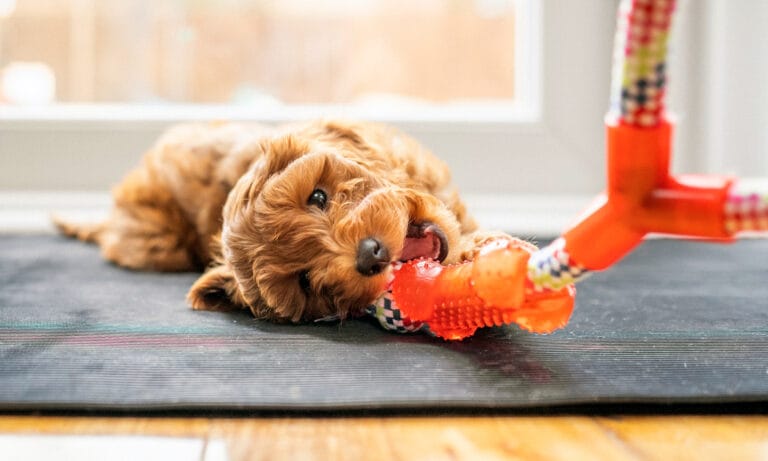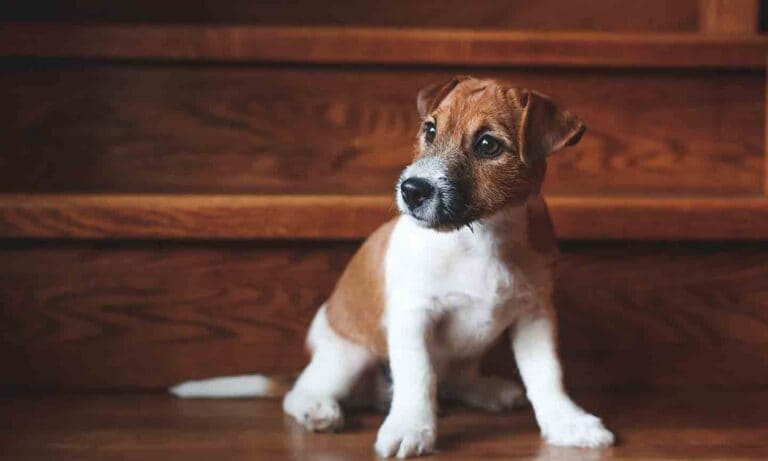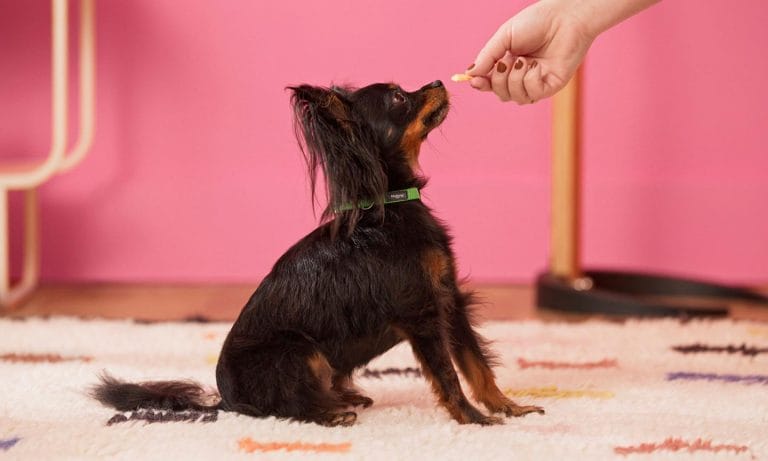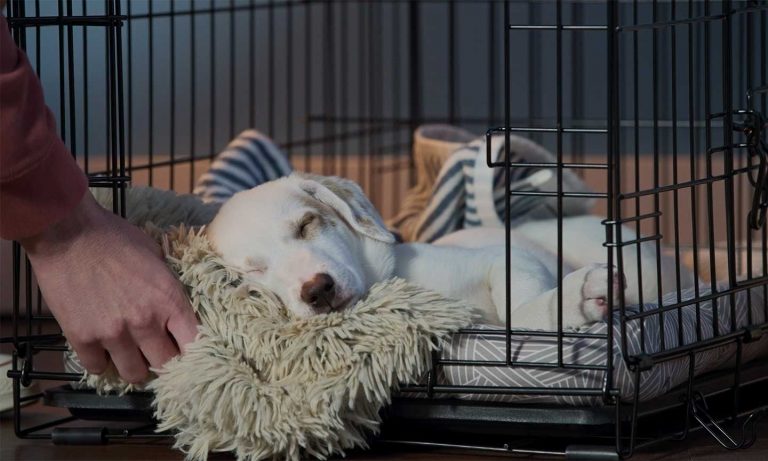Time flies when there’s a puppy in your home (and on your lap, on your couch, and in your bed). But even in those whirlwind early weeks, there’s a lot of important development going on.
Knowing more about your pup’s physical and mental growth is invaluable for bonding with your new best friend and keeping them safe and happy. This guide to puppy stages gives you an idea of what to expect as your little bundle of fur grows into a toddler, an adolescent, and beyond.
Here's what’s happening at each of your puppy’s development stages according to Chewy's resident veterinarian, Katy Nelson, DVM; and Lisa Radosta, DVM, DACVB, a veterinarian based in Palm Beach, Florida.
Birth to 3 Weeks
Changes in the Body
At this early stage, newborn puppies are fully dependent on their mother and shouldn’t be separated from her for any reason. If they’ve been orphaned, a devoted caretaker will have to take on the mother’s responsibilities—most importantly, frequent feedings.
In their first weeks of life, puppies eat approximately every 3-4 hours. Their mama dog’s diet should be high in calories and protein, and contain extra helpings of DHA and EPA—fatty acids important for brain development—so she can pass those nutrients on to her puppies. Because food designed for older puppies, like Purina® Pro Plan® Puppy Chicken & Rice Formula Dry Dog Food, often contains these nutrients, it’s ideal for pregnant dogs, too.
Newborn puppies who’ve been separated from their mothers will need to be bottle fed using puppy milk replacer. If you’re caring for a puppy this young, talk to your veterinarian about which puppy milk replacer is right for your dog.
Find out more about how to feed newborn puppies.
During all that feeding, there are big changes occurring in those teeny, little bodies. For starters, this is when newborn pups start growing fur. Their muscles and alertness are developing, too. They may try to stand or attempt to crawl (though they won’t typically take their first steps until they’ve reached 3 weeks old).
When Do Puppies Open Their Eyes?
Newborn puppies are born with their eyes initially sealed shut. This protects the eyes as they finish developing in a puppy’s first weeks of life. Puppies open their eyes when they’ve reached about 3 weeks of age, “as they get used to being in the world,” Dr. Nelson explains.
Changes in Behavior
At this early stage, a puppy’s life consists mainly of eating and sleeping—in fact, it’s normal for some newborn puppies to sleep for around 22 hours a day! That doesn’t leave much time for new behaviors to emerge, but just wait—you’ve got a wild ride ahead.
Pet Parenting Tips
- If possible, keep the puppy with their mother until they’re weaned. (More on weaning below.)
- If you’re bottle feeding, use your vet-recommended puppy milk replacer.
- Avoid contact with other dogs or people, as newborn puppies are susceptible to illnesses.
Looking for more tips on caring for newborn puppies? Click here.
3–4 Weeks
Changes in the Body
This puppy development stage lasts just one week, but there’s a lot going on in that short time. Those puppy dog eyes will open, and puppies’ hearing and teeth are beginning to develop, too. Puppies also find their voices at this stage, making those first adorable puppy yaps and whines.
Weaning, aka the gradual transition to solid food, begins at this stage as well. Pet parents should mix puppy food into puppy milk replacer and offer it to their puppy between nursing sessions with their mother. Over time, add more solid food to the mix until the diet is 100% solid food.
Changes in Behavior
At this stage, puppies begin to gain a bit of independence. They start exploring the world beyond their mother, often through practicing playing with their siblings. They also develop an interest in humans, and begin bonding with the people around them through gentle activities like holding and petting. So go ahead, snuggle that pup to your heart’s content—it’s good for you both!
When Do Puppies Start Walking?
Just like human babies, newborn puppies don’t have the muscle strength or coordination to walk—it takes time to grow and practice those skills! In general, puppies start walking when they reach about 4 weeks of age, though their first stumbling steps may come a week or so earlier.
Pet Parenting Tips
- Begin the weaning process by introducing a small amount of solid food into your puppy’s diet.
- Puppies need lots of holding and petting, a crucial first step in learning how to interact with humans.
- Keep puppies at this stage apart from other dogs, as they’re still vulnerable to illness.
1–3 months
Changes in the Body
This is when many of us bring our puppies home for the first time, at around 8–10 weeks. That’s because puppies are typically ready to leave their moms around that time. They’re fully weaned, with most puppies having transitioned to a diet of 100% solid food by 7-8 weeks.
Another reason puppies get to go out into the world at this stage? They’re better protected against illnesses. At around 6 weeks old, puppies are ready for their first vaccinations to prevent diseases like parvovirus and distemper. If you’re bringing a puppy of this age or older home from a shelter, rescue, or breeder, be sure to ask for their vaccine records and check with your vet to make sure they’re up to date.
During this stage, puppies are ready to take the first steps toward potty training—but don’t expect perfection right away. Their elimination muscles are still developing during this time, so you’ll have to take them out to do their business about once every hour or two.
Changes in Behavior
Of all puppy ages and stages, this one is where we see our stereotypical idea of puppyhood in action: the roly-poly, sweet but mischievous pup who’s curious about everything around them. They’re learning more about how to behave with humans, and it’s now safe for them to interact with dogs and cats who are fully vaccinated, and other animals as well.
In fact, they should be experiencing and interacting with just about everything in their world, especially between weeks 5–16 of your puppy’s life. That’s generally considered the socialization period, during which it’s important for them to have positive experiences with a diverse array of common people, places, animals, and things—think: dogs and cats, adults, and children of all shapes and sizes, car rides, doorbells, and even the rain.
The more they experience now, the less they’ll have to become fearful of later. Find out more about puppy socialization.
You’ll want to monitor your puppy’s experiences and interactions extra carefully between the ages of 6–8 weeks, though. This is when a “fear period” sets in, during which puppies are especially impressionable. Scary experiences during this time can lead to lifelong phobias.
Now is a good time to begin obedience training as well. Just like potty training, this will be a gradual process, so go into it with lots of patience. Consider starting with the basics, like sit, stay, and leash training.
Pet Parenting Tips
- Talk to your vet about your puppy’s first vaccines.
- Socialize your puppy by introducing them to lots of new people, animals and experiences.
- Avoid potentially frightening experiences and interactions during the fear period between 6–8 weeks of age.
- Begin the first steps of potty training and obedience training—but remember that their bodies and brains aren’t capable of perfection just yet.
3–8 months
Changes in the Body
It’s teething time! Puppies at this stage start to lose their puppy teeth and their adult teeth come in, making them want to gnaw on everything they encounter. Be sure you’re armed with appropriate chew toys to redirect them from your furniture and shoes.
This is also a period of major dog growth, as puppies’ bodies, including their weight, change rapidly at this age, especially in large-breed dogs. Bone is starting to fuse, and cartilage hardens. This is what causes that clumsy, goofy puppy play we love to see—but it also makes them more prone to injury, so make sure to supervise your puppy or put them in a safe environment like a dog crate or pen when you can’t watch them.
Puppies should complete their vaccinations by about 16 weeks, and begin taking preventatives for heartworm and flea and tick prevention. At this puppy stage, it’s also time to consider spaying or neutering. Females can go through heat as early as 4–6 months, and male dogs can produce sperm and mate with a female anywhere from 6–9 months old. (You may see your male puppy start to “mark” with his urine around this age.)
Changes in Behavior
Is your dog silly, shy, or serene? You’ll find out during this stage as your puppy’s true personality begins to emerge. That’s because puppies are learning to make independent decisions at this time, rather than simply following their instincts. You might see your pet struggle to decide whether to obey a command from you or chase after the squirrel they just spotted, for instance.
They may not always make the “right” choice, and will begin to test the boundaries of what they’re allowed and not allowed to do. Remember to have patience—after all, the fact that they’re using those decision-making skills at all is a big step in the right direction.
Some puppies go through another fear period between 6–8 months old. This second impressionable phase is often less impactful than the one your puppy goes through between 6–8 weeks, but it’s still wise to avoid stressful situations and use extra caution as your dog interacts with the world during this time, in order to prevent powerful negative associations from forming.
Pet Parenting Tips
- Provide your pup with healthy chew toys appropriate for their size and age to help with the discomfort of teething.
- Use a dog crate or pen to keep your puppy injury-free when you’re not able to supervise them.
- Talk to your veterinarian about spaying or neutering; flea, tick, and heartworm prevention; and completing your puppy vaccines.
8–12 months
Changes in the Body
How long is a dog considered a puppy? The answer depends largely on the size of your furry friend.
Small-breed dogs usually stop developing at around 1 year old, so this phase might mark the end of puppyhood for your sweet Chihuahua or Dachshund. For large breeds like a Golden Retriever or a Lab, on the other hand, a dog is considered a puppy until around 18 months. For giant breeds like a Great Dane or a Mastiff, puppyhood can last up to 24 months. Find out more about dog ages and how to understand them in human terms.
Your dog’s puppy (or not) status makes a difference in their diet. All dogs should be on puppy food for at least 10–12 months, but large-breed dogs may need to stick with puppy food until 18–24 months to ensure they have the nutrients they need to keep growing and developing. They should also be on a diet specifically for large breeds, which provide fewer calories and more glucosamine and chondroitin to help ensure slow, healthy dog growth. Talk to your veterinarian about when to switch to adult dog food.
Changes in Behavior
Your pup will continue to be curious and playful—and boundary-testing can persist in this stage of puppies’ development.
Remember: Dog training doesn’t end at puppyhood. Though many pet parents ease up on training when their puppy becomes an adult, obedience classes or spending time teaching your puppy some cool tricks yourself will continue to pay off, especially in your dog’s younger years. Dr. Radosta recommends that pet parents continue obedience training until their dog is at least 3 years old.
Pet Parenting Tips
- Talk to your vet about your puppy’s diet and when to switch to adult food.
- Enroll in an obedience class or teach your dog some cool new tricks to keep their mind sharp.
12–24 months
Changes in the Body
While little pups typically graduate to adulthood by their first birthday, larger breed dogs’ growth can continue until they’re 2 or, for some breeds, even 3 years old. By now, all breeds’ bodies will have begun to fill out, more closely resembling an adult dog.
But remember: Until they’ve fully finished growing, dogs’ bones, joints and muscles are vulnerable to injury. To prevent damage to your pup’s body, put off any repetitive training like running or walking long distances until they’ve finished growing.
Changes in Behavior
At this puppy stage, most dogs are emotionally mature. However, this can be a time when behavioral issues that seemed minor when your puppy was younger can become more serious. If your puppy was a little noise-sensitive at 6 months, for example, they could be storm-phobic between 1–3 years old. The sooner you take action to address behavioral issues, the sooner they’ll be resolved, so consult a veterinary behaviorist with any concerns you have.
Pet Parenting Tips
- Stick to puppy-approved playtime like fetch or gentle tug-of-war, and avoid long-distance running or walking until you’re certain your dog has finished growing.
- Address your dog’s anxieties or phobias with a veterinary behaviorist.
- Celebrate your dog’s entry into adulthood—and start looking forward to a lifetime of happiness together!
If you’ve passed through all these puppy ages and stages of development, congrats—your puppy is all grown up! You might miss the tiny paws and puppy breath, but luckily for all of us, dogs remain cute and playful throughout their lives. Usher your pup through these puppy stages with care and you’ll get to enjoy having a good dog by your side for years to come.
This content was medically reviewed by a veterinarian.
Puppy Care 101
Share:
